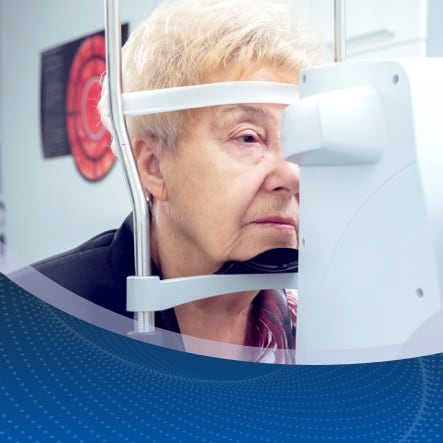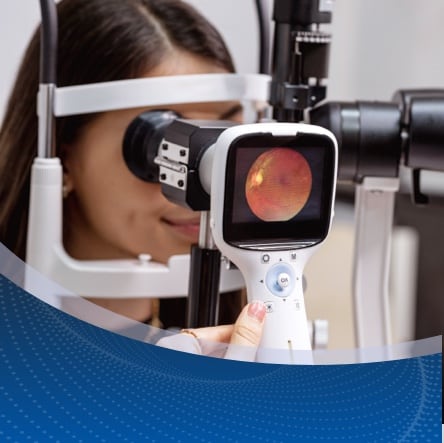Reviewed By: Leslie Forehand
Blurry vision in one eye can be concerning. Sometimes, a simple update to your glasses prescription might be all that is needed to get to the underlying cause. However, if you notice a sudden change in your vision, don’t dismiss it—it could signal a more serious medical issue.
Is it Normal for One Eye to Be Blurry?
No, and it is important to recognize when blurry vision is a minor inconvenience and when it requires urgent medical attention. For example, if severe headaches or neurological symptoms accompany blurry vision, it could indicate a stroke. Likewise, sudden floaters or flashes of light might suggest retinal problems. In these scenarios, seek immediate medical intervention for the best care.
You could have blurred vision for a week, a month, mere hours or days, or even indefinitely, based on your unique situation. You could also have a cloudy vision in one eye that comes and goes. So, how do you know when it’s time to see your eye doctor?
Continue reading Griffey’s guide from our eye doctors in Chesapeake, VA, on the common reasons for sudden blurry vision in one eye.
Reason #1 – Cataract
Cataracts cloud the eye’s lens over time, leading to progressively blurry vision. Although common in older adults, surgery is usually a reliable treatment. It replaces the clouded lens with an artificial one. This outpatient procedure can noticeably improve visual clarity and quality of life.
Reason #2 – Refractive Errors
Refractive errors are the most common cause of blurry vision. According to the National Eye Institute (NIH), over 150 million Americans have a refractive error without realizing it. They occur when the eye does not refract light properly onto the retina, resulting in blurry sight. Common refractive errors include:
- myopia (nearsightedness)
- hyperopia (farsightedness)
- astigmatism
- presbyopia
These errors may be correctable with eyeglasses, contact lenses, and/or surgery.
Reason #3 – Migraine
Migraines are known for causing severe headaches but can also affect vision. Some individuals experience sensory disturbances or auras, including blurry vision, flashes, or zig-zag patterns. While migraines with aura do not always include headache pain, managing this condition typically involves both lifestyle changes and medication, depending on frequency and severity.
Reason #4 – Age-Related Macular Degeneration (AMD)
AMD impacts central vision by affecting the macula. With two main types—wet and dry—wet AMD involves blood vessel leaks, while dry AMD occurs more gradually with age. Though there’s no cure, treatments slow progression via lifestyle adjustments and medical interventions to maintain eye health.
Reason #5 – Eye Infection
An eye infection can lead to blurry vision, alongside other symptoms like redness, swelling, or discharge from the eyes. Conjunctivitis, also known as pink eye, is one common infection, often treatable with eye drops or antibiotics. More severe infections might require a combination of treatments to manage infection and reduce inflammation.
Reason #6 – COVID-19
While less common, COVID-19 can induce symptoms like conjunctivitis, contributing to blurry vision. Stay updated on vaccinations and practice precautionary measures against the viral spread.
Reason #7 – Diabetes
Diabetes causes blurry vision and diabetic eye disease, impacting vision in varied ways, including diabetic retinopathy. Maintaining healthy blood glucose levels and regular eye exams helps early detection and treatment, preventing complications that could cause blurred vision.
Reason #8 – Stroke
Blurred vision can also be a stroke symptom, as it may affect brain regions responsible for visual processing. An acronym like FAST—Face drooping, Arm weakness, Speech difficulties, Time to call 911—helps identify stroke, emphasizing the urgent need for medical evaluation and treatment.
Reason #9 – Dry Eyes
Dry eyes can cause blurry vision in one eye, leading to insufficient lubrication on the eye’s surface. When the eye doesn’t produce enough tears or the quality of tears is poor, the cornea can become damaged. This damage can scatter light entering the eye, resulting in blurry vision. Dry eyes can also create a sensation of film over the eye.
Book Your Appointment with Griffey Eye Care & Laser Center
Foggy vision in one eye can result from various conditions, some benign while others needing immediate attention. Consulting healthcare professionals when symptoms persist or strengthen contributes to a more accurate diagnosis and appropriate treatment. To learn how to fix blurry vision in one eye, schedule a detailed appointment with Paul M. Griffey, M.D.
**Please note that the suggestions provided in this blog are for general informational purposes only and may not be suitable for your blurry peripheral vision in one eye. It is important to consult a qualified healthcare professional for personalized advice and treatment.**












